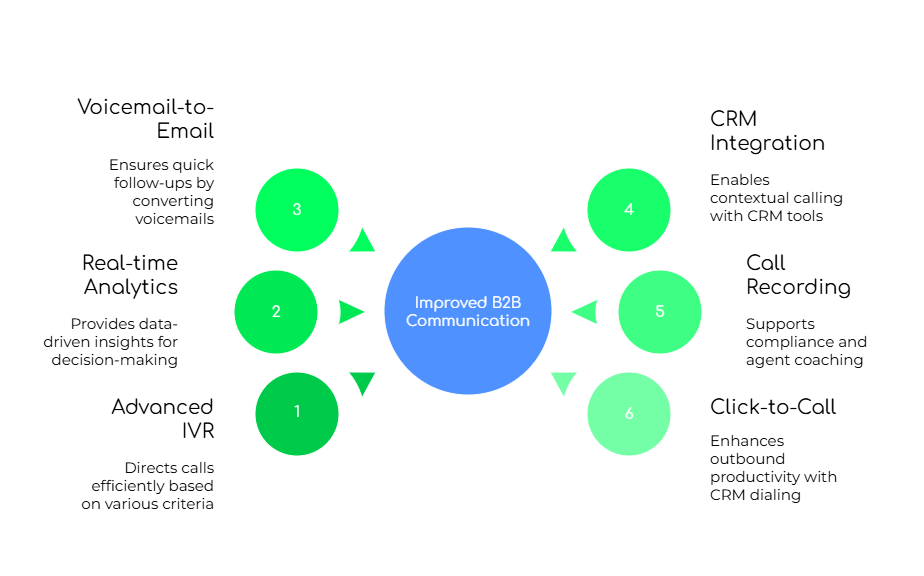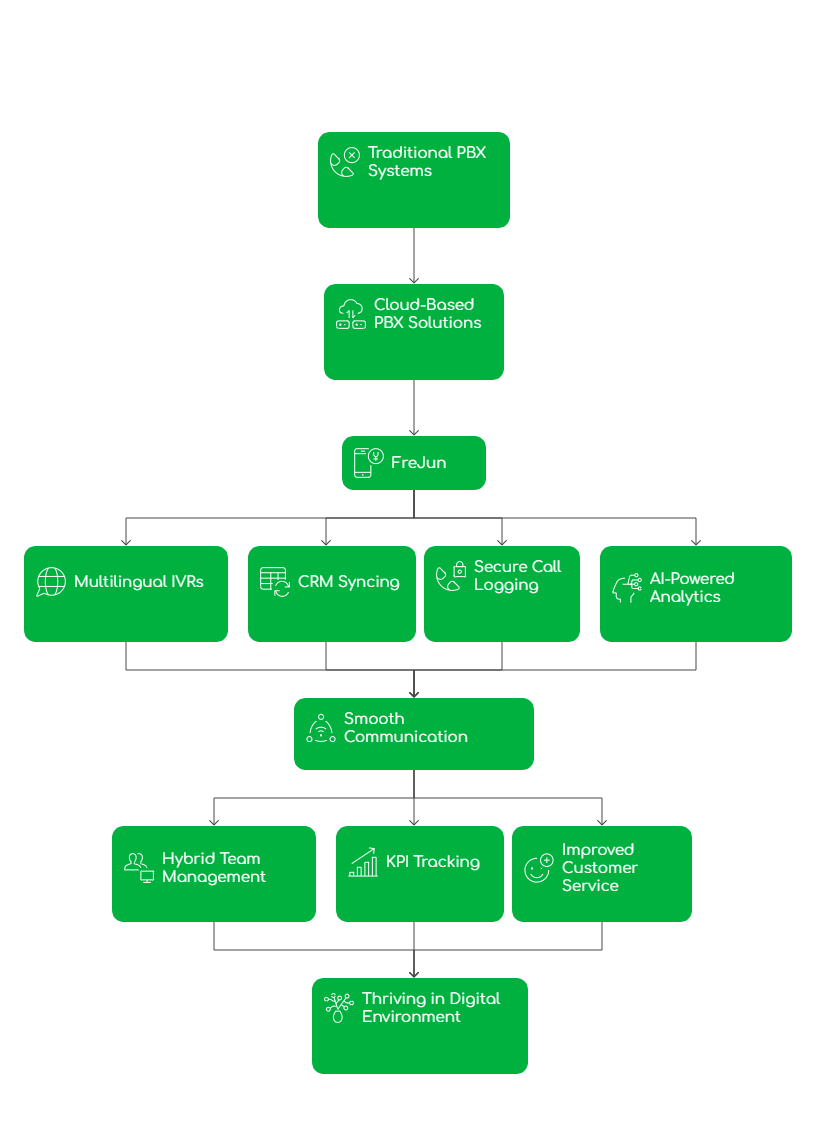How are Russian enterprises adapting their communication systems to meet the demands of modern B2B Communication? Traditional Private Automatic Branch Exchange (PABX) systems, once the backbone of enterprise telephony in Russia, are quickly showing their age. Though once effective for internal call routing and private networks, these on-premise setups now struggle to keep pace with the needs of distributed teams, rapid growth, and digital-first business models. Enter the modern approach that uses cloud infrastructure to virtualize telephony.
This evolution offers businesses unparalleled flexibility and remote capabilities, making it an ideal solution for today’s dynamic B2B Communication environments. With cloud-based PBX systems, Russian enterprises can manage voice communication, voicemails, extensions, and analytics through a centralized, browser-based dashboard. By eliminating the need for physical servers and cables, companies can significantly reduce capital expenses while improving scalability. Whether working from corporate offices, satellite branches, or remote locations, the system supports seamless access, providing a future-ready and operationally sound communication framework for Russian B2B enterprises.
Table of contents
Why B2B Communication Needs a Virtual PBX Setup?
B2B Communication operations in Russia involve complex workflows across sales, support, logistics, procurement, and compliance. The growing demand for remote work, real-time collaboration, and secure client engagement has exposed the limitations of legacy phone systems. Static landlines and traditional switchboards cannot handle the agility that modern business ecosystems require. This is where cloud-powered systems make a difference. It provides a cloud-based calling system accessible from any device or location, perfect for teams distributed across Moscow, Novosibirsk, or even international sites.

Automated call routing ensures that every query reaches the right department without delay, while integrated analytics provide actionable insights into communication efficiency. For B2B Communication enterprises handling large call volumes, client onboarding, or sales demos, cloud telephony ensures professionalism through features like personalized greetings, call recordings, and real-time dashboards. With FreJun, businesses gain an added advantage with its AI-powered call handling, seamless CRM integrations, and real-time monitoring, which elevate every interaction.
Core Features of Virtual PBX Phone Systems
These features improve B2B Communication and ensure every interaction is timely, professional, and aligned with business goals.
- Advanced IVR and Call Routing: Automatically directs inbound calls based on business hours, user inputs, or call type. This minimizes missed connections and optimizes the client experience.
- Real-time Analytics and Reporting: Business leaders can track KPIs such as response time, average call duration, missed calls, and resolution rates for data-driven decisions.

- Voicemail-to-Email: Converts voicemails into transcribed text and emails them to relevant recipients, ensuring quick follow-ups.
- CRM Integration: Seamlessly links with CRM tools like Bitrix24, Zoho, Salesforce, or Russian-developed platforms, enabling contextual calling.
- Call Recording and Monitoring: Supports legal compliance, internal audits, and agent coaching through searchable call logs and real-time monitoring.
- Click-to-Call: Enhances outbound productivity by allowing reps to dial from CRM entries and annotate interactions post-call.
Benefits for Russian Enterprises and B2B Operations
Russian B2B Communication enterprises, from tech startups to major industrial firms, are discovering the operational and strategic benefits of cloud-based telephony. One of the most significant advantages is scalability. With cloud PBX platforms, companies can easily expand communication systems as they grow into new markets or open additional branches.
Security is another crucial benefit. These systems support encrypted voice traffic and access control, meeting Russian data sovereignty and privacy regulations. They also support Russian-language interfaces and Cyrillic input, ensuring a seamless user experience for local staff.
Another major benefit lies in automation. Call forwarding, logging, and voicemail management no longer require human intervention. The system automatically tags and organizes call data, reducing the workload on support and admin teams. This allows employees to focus more on core responsibilities and improve overall B2B Communication effectiveness.

Setting Up Virtual PBX for B2B Use: Step-by-Step
Implementing a virtual PBX system for B2B Communication doesn’t have to be complicated. With the right approach, businesses can transition smoothly from legacy systems to a modern, cloud-based infrastructure. From identifying communication needs to selecting a reliable provider, each step plays a crucial role in ensuring the setup supports both current operations and future growth.
1. Define Requirements
Start by identifying the business needs. For example, is the goal to reduce missed calls, log calls in CRM, or improve call center efficiency? Create a checklist of essential features like IVR, call queues, or click-to-call.
2. Audit Infrastructure
Assess current internet bandwidth across branches or home setups. Stable internet is essential for high-quality VoIP calls. Implement routers that prioritize voice traffic (QoS-enabled devices).

3. Choose the Right Provider
Look for a provider offering SLA-backed uptime, native Russian-language support, secure hosting, and scalable pricing. Platforms like FreJun cater specifically to B2B Communication operations with enterprise-grade features.
4. Configure the Platform
Set up phone trees, extensions, routing logic, hold music, and voicemail options using the provider’s admin console. Test with select teams before rolling out department-wide.
5. Train and Launch
Provide onboarding support for your team. Ensure everyone understands how to use mobile apps, set status indicators, retrieve voicemails, and access call history. Monitor adoption post-launch.
Selecting a Virtual PBX Provider in Russia
Selecting a vendor involves more than comparing features; it requires understanding service reliability, local compliance, and adaptability. It’s recommended to follow frameworks like the OECD Guidelines for Supplier Selection and Due Diligence to ensure vendors align with ethical and operational standards.

- Russian-language dashboards, IVR support, and customer service
- Data hosting within the Russian Federation or the EEA
- Ruble-based billing models with transparent pricing
- Plug-and-play CRM integrations with Russian and global tools
- Elastic architecture to support seasonal hiring or project-based expansions
FreJun is one such provider with a proven track record in the Russian B2B Communication space. Their focus on automation, AI-enhanced analytics, and 24/7 support makes them a preferred choice for enterprise clients.
Key Takeaways
Modernising B2B Communication unlocks far more than just convenience; it fuels productivity, enhances performance, and reinforces a culture of professionalism across the organization. In today’s competitive business environment, companies in Russia can no longer rely on outdated telephony systems that limit flexibility and create bottlenecks. Instead, adopting a virtual PBX solution empowers enterprises to streamline internal workflows, improve client-facing services, and manage communication from a centralized, browser-based platform accessible anytime, anywhere.

With powerful features like CRM integration, intelligent call routing, voicemail transcription, call analytics, and real-time monitoring, teams can eliminate repetitive manual tasks and gain complete visibility into communication patterns. This not only reduces overhead and errors but also provides data-driven insights that enhance decision-making. For B2B Communication to thrive in the digital age, adopting a modern virtual PBX system is not merely a tech upgrade; it’s a foundational strategy for long-term agility, collaboration, and customer satisfaction.
Final Thoughts
As digital transformation continues to shape Russian enterprise operations, communication tools must evolve to match the pace and expectations of today’s B2B Communication landscape. Traditional PBX systems are no longer sufficient to support the agility, remote collaboration, and customer responsiveness that modern businesses demand. Cloud-based PBX solutions now lead the way, delivering flexibility, scalability, and seamless integration with critical business platforms. Companies that fail to adapt risk falling behind in both internal efficiency and external client engagement.
FreJun emerges as the ideal partner for Russian enterprises navigating this transformation. Its robust feature set, including CRM syncing, secure call logging, and AI-powered analytics, ensures that communication flows smoothly across departments and regions. Whether managing hybrid teams, tracking KPIs, or improving customer service quality, FreJun equips businesses with everything they need to thrive in a digital-first environment. With 24/7 Russian-language support, compliance with local data regulations, and fast deployment, FreJun doesn’t just offer a tool; it delivers a fully supported ecosystem designed to elevate B2B Communication at scale.

Further Readings – Virtual Phone Solutions for Sweden-US Business Communication
FAQs
FreJun ensures reliable, location-independent calling through cloud-hosted access, letting every team, whether in Moscow or Vladivostok, stay connected using desktop and mobile applications.
FreJun provides complete Russian-language support, including intuitive interfaces, onboarding guidance, and IVR scripting tailored for native speakers.
FreJun integrates directly with regionally popular tools like Bitrix24 and AmoCRM, helping businesses keep every client conversation and deal stage tracked effortlessly.
FreJun optimizes voice traffic through smart call routing and QoS settings, ensuring stable, crystal-clear communication on any broadband connection.
FreJun offers a scalable framework designed for regional growth, with infrastructure and support that seamlessly adapts to cross-border expansion needs.
